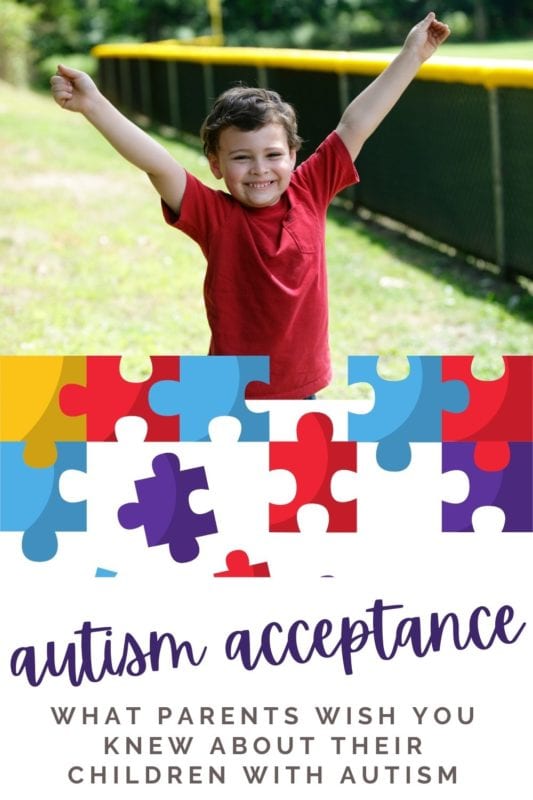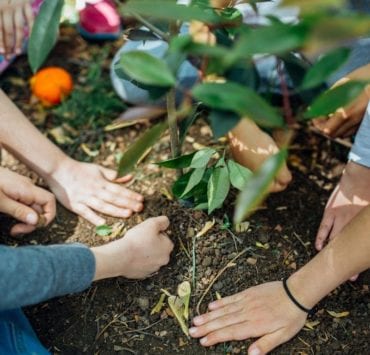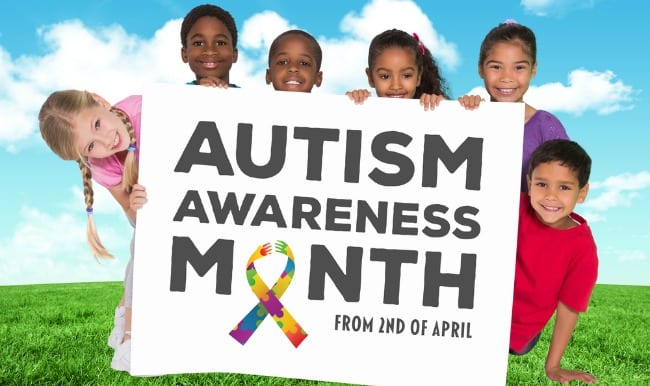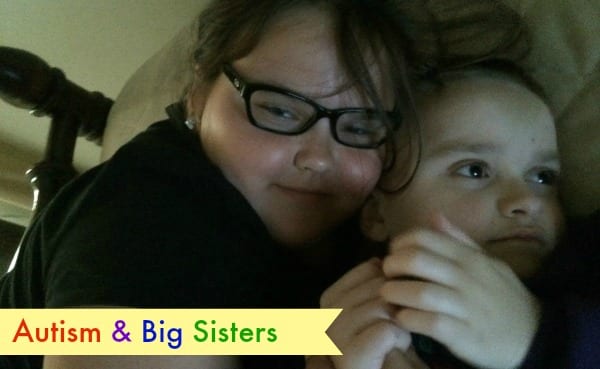My Child Has Autism. This is What I Wish You Knew About Them.

April is Autism Acceptance Month, a chance for all of us to learn more about what autism is in its many forms and what parents of children with autism need from their support systems and their communities. For Autism Acceptance Month, Rocket City Mom wanted to take a different approach to this subject: we wanted to hear from parents of children with autism. We asked these parents to share what they wanted others to know about their child. At the heart of this month is more than just awareness; ultimately, what all parents want for their children is acceptance for who they are and what they bring to the world around them.
With 1 in 54 children diagnosed with autism in 2020, our goal is to share more about what autism looks like from the inside to pave the way for acceptance at school, at the playground, and more.
What I Wish You Knew About My Child with Autism
Sue C. on her 13 year-old son
My son wants to interact, participate, and be included with his peers and have friendships. He is like any typical kid and wants to have a voice, to be seen, and to be heard. He is warm, kind-hearted and can be more sympathetic than other kids. He loves to laugh and smile and try to make jokes to make other people laugh and smile too. Even though he has a lot of difficulty expressing how he feels and what he’s thinking inside his mind and heart, he loves to go on family trips to different places and try different excursions as long as he’s with family and friendly peers. I wish that other children and adults would give him a chance and an invitation and be more encouraging to include him and be more patience with him.
Robin G. on her 5 year-old son
My husband and I may have a different approach than others, because if you meet us at a playground or a birthday party, we openly share Wesley’s diagnosis. We want others to understand why he may not interact with other kids, or why he squeals and babbles more than he talks. We don’t share his story for sympathy, we share it with pride. He is different and he faces challenges unlike most kids, but he is smart and special and surrounded by his own personal cheering section.
To anyone who meets us: don’t be uncomfortable. Ask questions. Welcome us and Wesley into your lives. You can tell your kids that Wesley might not talk or play typically but that doesn’t mean not to try.
There was one day pre-Covid that we were at a local playground and Wesley was entertaining himself happily by sliding tongs down the kiddy slide, following, and picking them up and repeating the process all over again. A little girl about the same age decided to join him in play by picking up the tongs when they fell. She quickly understood that Wesley wanted them back each time, and willingly handed them to him. And so, for a few minutes, they played “together,” and even though it probably wasn’t a big deal to anyone else, we were thrilled.
My hope for my son is that he always finds people who will make an effort to join him in his world. I hope that we can teach our kids kindness and acceptance no matter their differences. I hope that he is able to achieve anything he wants in life, and I’ll do my best to guide and encourage him every step of the way.
Jen B. on her 12 year-old daughter
I feel like the hardest part for me has been figuring out how to help her mature and learn to do things (school, sports, friends, etc.) on her own without letting her flounder so much that she becomes defeated and gives up completely. This is tricky and I’ve not mastered it yet.
I think it’s very natural for neurotypical kids (and their parents) to just ignore the “weirdos” and go about their day. There are plenty of kids for them to play with and it can be harder to play with or be friends with a child who sees and experiences the world differently. I guess I’m saying, it’s worth putting in the effort because neurodiverse kids are some of the most amazing kids I know. My child is hilarious and kind and empathetic to a degree that is almost painful for her. She is talented and smart and she is always thinking of how to make other people’s lives better. I know she will do amazing things and I’m looking forward to meeting her as an adult. People who overlook her because she’s different are missing out.
Alisha B. on her two sons, ages 23 and 21
My boys are just like every other they just have certain quirks that make them a little different and at the same time special. Zachary has always been a very caring person. For example, if he sees a kid sitting by themselves and no one talking to them, he will go up and befriend them. Now as he has gotten older, he seems to keep to himself more. Noah is happy all the time and laughing and very outgoing. His friends accept him and they keep him in check. I think for both my boys, their friends have shown me what a great person they both are, and they look past their ASD.
I will also encourage other parents to be vocal if they think their child has ASD and doctors don’t want to test them. If I had pushed the issued my boys would have gotten ABA therapy sooner and things wouldn’t haven so hard on them and us at home. The boys started getting ABA at the ages of 13 & 15 and it helped tremendously.
Megan D. on her 10 year-old son
Children with autism will surprise anyone. You would be amazed at what they pay attention to and what they learn. I believe my son is more keen of an observer than a typical child. He just keeps it to himself mostly. It’s like he has his own little world inside of himself. Things are compartmentalized differently than most typical children. He thinks outside of the box and approaches things in ways that most people could never comprehend. I wish I could get other children to understand this. They think that my son is “simple”, when, in fact, he’s far more complex than what meets the eye.
I wish typical adults and children could understand that when he has a fit, it’s because he’s overstimulated. Sudden changes and loud noises are much more extreme for him. It’s like taking a funnel and holding it to your ear and having every noise in the vicinity funneled into your ear all at once. It’s overwhelming. Patience is a true virtue, and a must when trying to understand a person with autism.
Emily S. on her 12 year-old son
My son takes everything said very literally and needs time to process information given to him. I find it much easier to connect with younger teachers and parents about my son’s autism. They seem to have more experience, or knowledge about it.
My son has no close friends. He does want friendships, but I find a lot of families are not aware of children with autism. I have actually received phone calls from parents of other children asking why my son does certain things, or if I will medicate my child. Even if it is over the phone, or text, a connection is so important to my son. He meets kids, and wants a second play or fun session and he does not understand why kids won’t come back to play.
Jane B. on her 9 year-old daughter
E’s routine is very rigid when it comes to anything that has a scored outcome – school, sports, etc. She is extremely critical of herself which translates into a need to always succeed and receive positive comments from teachers and coaches. Rules are a top priority in her life. She does everything according to whatever the rules are, but struggles to understand nuances, such as the fairly standard rule of “no talking” in certain spaces in schools. Many kids would understand emergencies are an exception, but E does not. This has negatively impacted her on more than one occasion.
I would like everyone to know that autism is a wide spectrum. Autistic girls are more likely to be misdiagnosed, or not diagnosed at all because they are able to mimic the behaviors of their peers. Many are internalizing their daily interactions to the point of breakdowns because they run their lives according to a set of rules that they believe can never be broken. They are more likely to be victims of sexual abuse and assault, suicide, and have eating disorders. I wish I could tell other children to ask questions. To just talk to her and ask what she likes to do. She isn’t comfortable introducing herself to others, but would be so happy to answer questions if they initiate.
Amy F. on her 14 year-old son
Even though Brian and some other individuals with special needs are nonverbal, they understand everything you are saying and have feelings too, even if they can’t show you. Once someone finds out that my son is nonverbal, they talk to me as if he’s not there. Talk to my son. At times, you’ll be surprised at how well our children can communicate through gestures and other means without being able to speak.
Many of our children have sensitivities to stimuli such as lights, sounds, touch and environments that have a combination of these things. Many of our children stim in order to equilibrate themselves to external stimuli in the environment. Stimming is a self-stimulatory behavior or calming mechanism, repetitive in nature, that helps an individual with autism remain calm in an environment they have no control over. A few examples of stimming behavior include hand-flapping, rocking back and forth, spinning, head-banging, pacing, smelling people or objects, repeating phrases over and over, shrieking and so many other things. Do not stop an individual from stimming unless they are a danger to themselves or others.
Invite our children to birthday parties. You would be amazed at how quickly invitations stop coming to our children for birthday parties, playdates and other activities. Our children are ostracized and isolated; please include them.
Each of our children have special gifts and have so many things to contribute to society. Never underestimate their potential.
Nancy V. on her 15 year-old son
I truly believe that any adult or child that interacts with my son and gets to know him are blessed beyond everything. People are missing out by not getting to have people like Michael in their lives. He does not judge anyone by appearances. He does not like when you are not nice to him or to his family. If you are nice, he will love you forever no matter how you look, what you do for a living, your religion, etc. He will say what he wants or sing loudly or wave at the moon and loves when you join in with him. He does not care who else sees or hears him. I wish I was more like that.
I would just encourage everyone to have patience with him and spend some time with him and treat him as you would any young man. He may not always answer your questions, but he knows you are there, and one day, you will see how happy he is to say hi to you. Also, he does remember the things you say to him even if it is years later before he shows it. He is really a good example to follow in how to treat others.
LaBreeska C. on her 10 year-old son
My son has a very kind heart and he is very polite and respectful. He is a very touchy, feely kid, so he loves to give hugs. He can, at times, be a strict rule follower and brutally honest. He likes what he likes and will talk to you for minutes upon minutes about a particular subject of interest, whether you want to hear it or not.
I would like for other adults to know that my child is amazing. His differences are what makes him such an awesome kid. The things that seem insignificant to us, are important and valued by him. I would like for other children to know that my son is a great friend and he is loyal. Lastly, always show yourselves friendly to others no matter how alike or different someone may be in your opinion.
Yashica S. on her 15 year-old son
Jay’s personality is reserved & very knowledgeable. Jay was in the 6th grade & he won the North Alabama Technology Competition that qualified him for the state technology competition. We know Jay is very talented but, because he doesn’t express his emotions or share unless prompted, we were amazed with his ability to create & produce animation.
The ultimate takeaway I’d like other to know is when you notice a teenager with needs understand that no matter what their behaviors may be, they are human beings that are capable of communicating even if it appears not typical! Hidden disabilities are not the same for every person. Even though jay does not respond to you as most teenagers, he still can hear & understand rude comments & yes, he has feelings! Don’t let what you have heard or read about autism fool you. The universal language across the board starts with a smile & a hello! Our son may be on the autism spectrum & not smile all the time but if you smile & say hello, he knows that you are approachable. Just remember my son is like most teenagers & friendships matter to him too!
Leigh B. on her 10 year-old son
I always feared Alex would have a hard time making friends. He has a very outgoing personality. We’ve been fortunate to live in a close-knit community with friends who spoke with their children about him having ASD.
Alex presents as a neuro-typical child until you start speaking to him. People quickly realize that’s not the case. I would just like parents, including other parents of ASD kids, to realize every child is different and just because he presents as neuro-typical, doesn’t mean he is. It’s not fair that other ASD parents compare him to their children and act like he has it easier. Every child on the spectrum has hills and mountains to climb in the world – some kids have Everest and some kids don’t. That doesn’t mean I worry any less about his future or about his ability to care for himself. Although he’s smart, he still can’t tie his shoes or shower without help. He has to be helped with things that most children master by 10 years old like dressing themselves or bathing. He may be able to do complicated math or code a robot, but that doesn’t mean anything if you can’t focus on basic needs like eating.
As we learn more about autism and the myriad ways it affects people at all ages, we are able to better diagnose and work with the challenges it presents. Because it is a spectrum disorder, autism does not look the same from child to child: some will talk on time and others may require other means of communication to share their thoughts and needs with the world around them. All children have challenges, but the hurdles that children with autism and their families face often require a team of helpers to diagnose and then find the right solutions to help their children reach their full potential.
You Might also Like…
- A Parent’s Guide to Special Needs Resources in Huntsville
- Choosing a Pediatrician for Your Child with Special Needs
- Navigating IEP Meetings

Jennifer Kelly grew up in the Birmingham area, but migrated to Huntsville for graduate school and put down roots after meeting her husband, Jamie. In addition to being a mom to her two boys, she is a tennis ninja, trivia nerd, freelance editor, and aspiring writer. You can visit her at The Sir Barton Project, a blog about her upcoming book.







